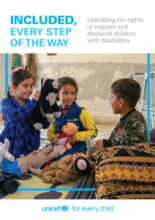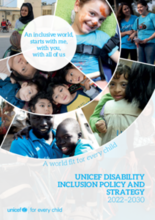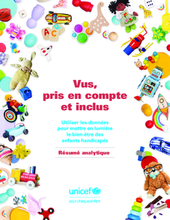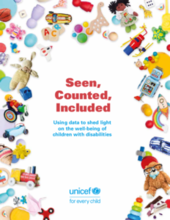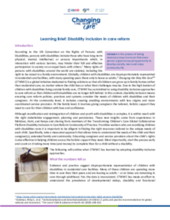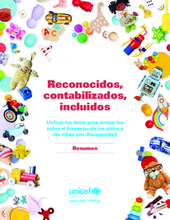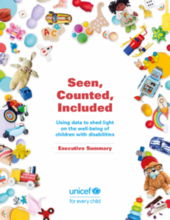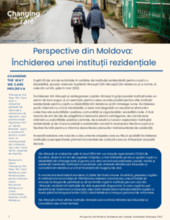Displaying 51 - 60 of 499
Children with disabilities and children on the move represent highly diverse populations living in a broad range of circumstances. But as two of the most marginalized groups of children in the world, there is much they have in common, often-times neglected in data collection, policies and programming. This report examines children’s lives when these two identities intersect.
Brief overview of the situation regarding the rights of people with disabilities in Ukraine one year after the beginning of the invasion of Ukraine by Russia.
UNICEF's DIPAS is a roadmap for greater cross-sectoral coordination for disability inclusion to be mainstreamed across the organization at every level to meet the needs of the world’s 240 million children with disabilities.
L’objectif du présent rapport est de promouvoir l’utilisation de ces données afin de rendre les enfants handicapés davantage visibles et de mieux comprendre leurs expériences de vie.
Millions of children with disabilities around the globe continue to be left behind, despite the near-universal ratification of the Convention on the Rights of the Child, the call for action embedded in the Convention on the Rights of Persons
After 60 years of serving as a residential institution for children with disabilities, the Hîncești Auxiliary Boarding school (SIA Hîncești) in Moldova closed its doors to children in May 2022. The closing of Hîncești SIA serves as a harbinger for what is possible for other institutions for children with disabilities in Moldova and around the world.
This learning brief was developed as part of the CTWWC 2022 annual report and shares learning from Kenya and beyond. It is intended to help other practitioners understand how disability inclusion happens by sharing examples of practice.
El informe tiene como objetivo promover el uso de estos datos con el propósito de dar más protagonismo a los niños y niñas con discapacidad y de ese modo lograr una conciencia más plena de sus vivencias.
The report’s objective is to promote the use of these data to make children with disabilities more visible, bringing about a fuller understanding of their life experiences.
După 60 de ani de activitate în calitate de instituție rezidențială pentru copii cu dizabilități, Școala-Internat Auxiliară Hîncești (SIA Hîncești) din Moldova și-a închis, în cele din urmă, ușile în mai 2022. Închiderea SIA Hîncești și reint

